
IJC Heart & Vasculature
Scope & Guideline
Your Gateway to Cutting-Edge Cardiovascular Research
Introduction
Aims and Scopes
- Cardiovascular Interventions and Outcomes:
The journal frequently publishes studies on various cardiovascular interventions such as transcatheter aortic valve replacements and catheter ablations, evaluating their effectiveness and long-term outcomes. - Heart Failure and Cardiomyopathy:
Research on heart failure, including different ejection fractions and cardiomyopathies, is a major focus. This includes investigations into treatment strategies, biomarkers, and patient outcomes. - Atrial Fibrillation Management:
A significant portion of the research addresses atrial fibrillation, exploring various management strategies, anticoagulation therapies, and the implications of this condition on patient health. - Diagnostic Innovations and Imaging Techniques:
The journal emphasizes advancements in diagnostic tools and imaging techniques, such as cardiac MRI, echocardiography, and invasive procedures, to enhance the understanding of cardiovascular diseases. - Epidemiology and Risk Factor Studies:
Epidemiological studies assessing risk factors and health outcomes related to cardiovascular diseases are integral to the journal, providing insights into population health. - Translational and Basic Research:
The journal promotes translational research that bridges basic science and clinical applications, aiming to improve therapeutic approaches and understanding of cardiovascular pathophysiology.
Trending and Emerging
- Impact of COVID-19 on Cardiovascular Health:
Research exploring the effects of COVID-19 on cardiovascular health, including the implications for patients with pre-existing conditions, is increasingly prevalent, reflecting the pandemic's ongoing influence on cardiovascular care. - Use of Artificial Intelligence and Machine Learning:
There is a growing trend towards the application of artificial intelligence and machine learning in cardiovascular diagnostics and management, indicating a shift towards more data-driven approaches in clinical practice. - Patient-Centered Care and Quality of Life:
Studies focusing on patient-reported outcomes, quality of life, and shared decision-making in cardiovascular care are gaining traction, emphasizing the importance of patient perspectives in treatment planning. - Integrated Approaches to Heart Failure Management:
Emerging research emphasizes integrated, multidisciplinary approaches to heart failure management, including the use of technology and rehabilitation programs to improve patient outcomes. - Biomarker Research and Personalized Medicine:
There is an increasing focus on biomarkers and personalized medicine in cardiovascular disease, reflecting a trend towards tailored treatment strategies based on individual patient profiles.
Declining or Waning
- Traditional Pharmacotherapy Research:
There is a noticeable decline in studies focused solely on traditional pharmacotherapy for cardiovascular conditions, as the field shifts towards more integrated and innovative treatment approaches. - Single-Center Studies:
The prevalence of single-center studies appears to be waning, with a trend towards multicenter and larger population studies that provide more robust data and generalizability. - Basic Science without Clinical Relevance:
Research that does not connect basic science findings to clinical applications is becoming less common, as the journal prioritizes studies that demonstrate clear implications for patient care and outcomes.
Similar Journals

Revista de la Federacion Argentina de Cardiologia
Innovating cardiology through research and dialogue.Revista de la Federacion Argentina de Cardiologia is a vital publication in the field of Cardiology and Cardiovascular Medicine, providing a platform for researchers and healthcare professionals to share significant findings and innovative concepts since its inception in 2012. Published by the Federacion Argentina Cardiology, this journal specifically addresses contemporary issues and advancements within cardiology, contributing to the scholarly dialogue essential for improving cardiovascular health. Despite being categorized in the Q4 quartile for 2023 and presently ranking #358 out of 387 in its field, the journal remains committed to fostering academic inquiry and disseminating valuable research for both local and global audiences. Although it is not an open-access journal, it strives to balance accessibility with rigorous academic standards, ensuring quality contributions that are critical for practitioners and students alike. The journal’s ongoing evaluation and adaptation in the ever-evolving landscape of cardiology underscore its importance in advancing cardiovascular science and practice.
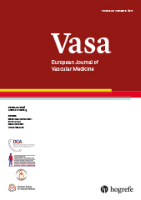
Vasa-European Journal of Vascular Medicine
Elevating Vascular Medicine Through Innovative ResearchVasa - European Journal of Vascular Medicine is a leading peer-reviewed journal dedicated to advancing the field of vascular medicine, published by HOGREFE AG in Switzerland. With a proud history dating back to 1972, this journal serves as a critical platform for researchers, clinicians, and healthcare professionals committed to enhancing knowledge and practice related to cardiovascular health and vascular disorders. Holding a notable Q2 ranking in the cardiology and cardiovascular medicine category, Vasa’s scholarly contributions reflect high-quality research and innovative insights that drive clinical applications. The journal provides essential access to original articles, reviews, and case studies, fostering a vibrant exchange of ideas within the vascular medicine community. Its Scopus rank of #159 out of 387 further underscores its impact, placing it confidently in the 59th percentile among its peers. Vasa is synonymous with rigorous academic standards and relevance, making it an invaluable resource for anyone seeking to stay at the forefront of vascular research and its clinical implications.

Cardiology and Therapy
Connecting researchers and clinicians for heart health advancement.Cardiology and Therapy, published by SPRINGER LONDON LTD, is a leading open-access journal dedicated to advancing the field of cardiology and cardiovascular medicine. With an ISSN of 2193-8261 and an E-ISSN of 2193-6544, this esteemed journal has been at the forefront of disseminating high-quality research since its inception in 2012. It has achieved an impressive Q1 ranking in the 2023 Cardiology and Cardiovascular Medicine category, reflecting its commitment to excellence and relevance in the field. Spanning a wide array of topics—from clinical studies to cutting-edge therapeutic interventions—the journal aims to foster knowledge exchange among researchers, clinicians, and healthcare professionals. In addition, its position in the 72nd percentile of Scopus rankings underscores its global impact and contribution to the cardiovascular research community. With open access options, Cardiology and Therapy ensures that its content is widely accessible, promoting the sharing of vital findings that can influence clinical practice and improve patient outcomes.
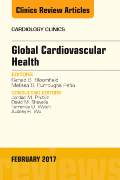
CARDIOLOGY CLINICS
Advancing cardiovascular knowledge for a healthier tomorrow.CARDIOLOGY CLINICS is a prestigious journal published by W B SAUNDERS CO-ELSEVIER INC, offering insightful and comprehensive reviews in the field of cardiology and cardiovascular medicine since its inception in 1983. With its ISSN 0733-8651 and E-ISSN 1558-2264, the journal has established a significant impact factor within the academic community, holding a Q2 ranking in both Cardiology and Cardiovascular Medicine as well as in Medicine (miscellaneous) for 2023. Located in the heart of Philadelphia, USA, it serves as a vital resource for researchers, clinicians, and students seeking to deepen their understanding of cardiovascular diseases and advancements in treatment. Although it operates under a traditional subscription model, the journal remains committed to disseminating valuable knowledge that shapes current practices and informs future research directions. As it converges towards its 2024 issues, CARDIOLOGY CLINICS continues to play an influential role in enhancing the discourse on cardiovascular health worldwide, ensuring that its audience stays at the forefront of clinical and scientific developments.
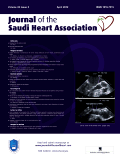
Journal of the Saudi Heart Association
Pioneering Insights in Cardiovascular Medicine Since 2009The Journal of the Saudi Heart Association is a prominent scholarly publication dedicated to advancing knowledge in the fields of cardiology and cardiovascular medicine. Published by DIGITAL COMMONS BEPRESS, this open-access journal has been serving the global community since 2009, providing a vital platform for researchers, practitioners, and students interested in the latest developments in heart health and disease management. With an ISSN of 1016-7315 and a growing repository of knowledge alongside an E-ISSN of 2212-5043, the journal showcases an array of peer-reviewed articles that contribute to the understanding of cardiovascular conditions. Although categorized in the Q4 quartile for 2023, it remains committed to offering valuable insights, particularly within the constraints of the 29th percentile rank specified by Scopus. As the journal converges towards 2024, it continues to foster collaboration, innovation, and inquiry within the Saudi Arabian and international medical communities.

Frontiers in Cardiovascular Medicine
Unlocking Innovations in Cardiovascular Medicine.Frontiers in Cardiovascular Medicine is a leading open-access journal published by FRONTIERS MEDIA SA, dedicated to advancing research in the field of cardiology and cardiovascular medicine. Since its inception in 2014, the journal has become a vital platform for the dissemination of high-quality research, boasting a commendable Q2 rank in the 2023 category for Cardiology and Cardiovascular Medicine. With a focus on promoting innovative studies and clinical insights, Frontiers in Cardiovascular Medicine facilitates open access to its content, allowing researchers, healthcare professionals, and students from around the globe to engage with the latest findings which are critical for the advancement of cardiovascular health. The journal's significant presence in the academic landscape, as indicated by its Scopus ranking (161/387 and 58th percentile), underscores its importance as a research outlet in this essential field. Located in Lausanne, Switzerland, the journal continues to support the global cardiovascular community by encouraging collaboration and knowledge sharing to address the challenges faced in cardiovascular medicine today.

HEART AND VESSELS
Fostering Knowledge for a Stronger Cardiovascular FutureHEART AND VESSELS is a prominent peer-reviewed journal published by SPRINGER, dedicated to advancing the fields of cardiology and cardiovascular medicine. With its ISSN 0910-8327 and E-ISSN 1615-2573, this esteemed journal encompasses a broad range of topics pertinent to heart health, vascular function, and associated therapies, making it an essential resource for researchers, clinicians, and healthcare professionals alike. Based in Japan and operating since 1985, HEART AND VESSELS has consistently maintained a Q2 ranking in the 2023 category quartiles, highlighting its relevance and impact in the cardio domain. Although it does not offer open access, the journal ensures high-quality publications that contribute significantly to the academic and clinical understanding of cardiovascular health. With over three decades of continuous scholarly contribution, HEART AND VESSELS serves as a vital platform for disseminating cutting-edge research and fostering innovative practices in the management of cardiovascular diseases.
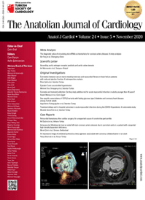
Anatolian Journal of Cardiology
Transforming Cardiology with Rigorous Research and Peer Review.The Anatolian Journal of Cardiology, published by KARE PUBL, stands as a vital resource in the field of Cardiology and Cardiovascular Medicine. With an ISSN of 2149-2263 and E-ISSN 2149-2271, this Open Access journal has been fostering the dissemination of critical research since 2001, ensuring that high-quality content is freely available to a global audience. Based in Turkey, the journal aims to bridge gaps in cardiological knowledge through rigorous peer-reviewed articles that span a wide range of topics, from innovative clinical practices to groundbreaking research findings. While its current ranking places it in the Q3 category of cardiology journals, the Anatolian Journal of Cardiology continues to strive towards enhancing its impact, currently holding a Scopus rank of 236 out of 387. Researchers, practitioners, and students alike will find this journal an essential platform for keeping abreast of the latest developments in cardiovascular health.
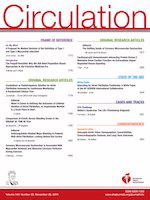
CIRCULATION
Driving Discoveries in Cardiovascular Health Since 1950.CIRCULATION is a premier journal in the field of cardiology and cardiovascular medicine, published by Lippincott Williams & Wilkins. With a distinguished history dating back to 1950, the journal has consistently been at the forefront of critical research, showcasing significant advancements and discoveries in cardiovascular health. It holds a remarkable Q1 ranking in both the fields of Cardiology and Physiology (medical) according to the 2023 category quartiles, demonstrating its influential role among the top publications in these disciplines. With an impressive Scopus ranking, placed 3rd out of 387 in Cardiology and 2nd out of 113 in Physiology, CIRCULATION is essential reading for researchers, practitioners, and students passionate about advancing their understanding of heart health and related medical sciences. Although the journal is not open access, it continues to foster scholarly exchange and innovation in cardiovascular research, making it an indispensable resource for quality insights and groundbreaking studies.
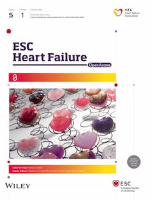
ESC Heart Failure
Empowering healthcare professionals with vital cardiovascular insights.ESC Heart Failure is a premier academic journal dedicated to the field of cardiology, specifically focusing on heart failure and its management. Published by WILEY PERIODICALS, INC, this esteemed journal has been an open access publication since 2014, making cutting-edge research readily accessible to a global audience. With its impressive impact factor and recent classification as a Q1 journal in Cardiology and Cardiovascular Medicine for 2023, ESC Heart Failure stands out as a leading resource with a Scopus ranking of #68 out of 387 in its field, placing it in the 82nd percentile. The journal aims to disseminate vital research findings, reviews, and clinical insights that advance the understanding and treatment of heart failure, thereby supporting healthcare professionals, researchers, and students in enhancing patient care. Its commitment to quality and relevance makes ESC Heart Failure an essential publication for anyone involved in cardiovascular medicine.